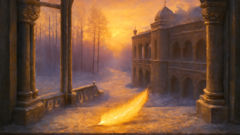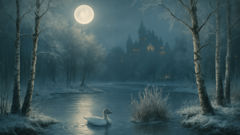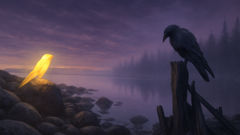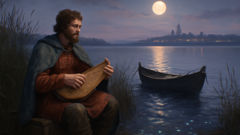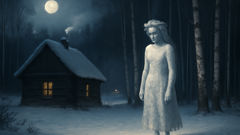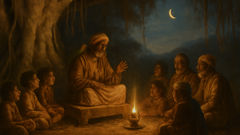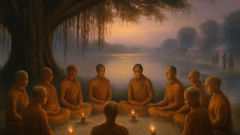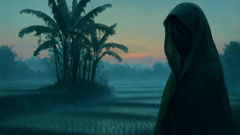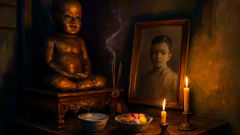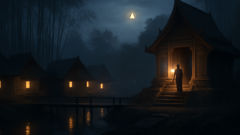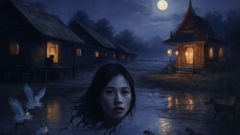Introduction
In a land stitched from birch and frost, where rivers braided through lowlands and pine-scented winds told stories to anyone who would listen, there was a kingdom that kept its most dazzling secret in the hush of twilight. The people of that kingdom spoke of a bird whose feathers burned like sunrise and whose cry could change the course of a man’s fate. They called it the Firebird, and to see it was to be both blessed and burdened—blessed with a beauty no cloth could hold, burdened with desire that would not be satisfied. Prince Ivan was not a man of careless courage. He was the youngest of three brothers, given small blessings and scant attention, yet his heart was big enough to feel hunger for wonder rather than merely for wealth. The court whispered that the Firebird had taken a single golden feather from the palace garden, a feather that lit the night like a lantern. That feather lay on the prince’s windowsill one dawn, a single ember of plumage that seemed to smolder with questions. When the missing feather became the talk of the halls, Ivan promised he would find the dazzling bird—not to hoard its light, but to return what had been taken and prove his worth. This vow set him on a path where forests turned into riddles, where wolves spoke in riddles older than men, and where a magic grey wolf would appear to offer help that would cost him more than he first understood. The forest waited with patient teeth and patient song. So began the journey of a prince, a bird of fire, and, beneath many moons, a princess named Vasilisa whose laughter held its own kind of light. The two lights—bird and maiden—would meet in ways that would test truth, loyalty, and the idea that a heart could be free and bound at once.
The Journey and the Grey Wolf
The roads beyond the palace were not marked by signposts but by the stories travelers left behind—charred twigs where giants had once slumbered, coins turned to stones by jealous nymphs, and the faint smell of smoke that lingered long after a campfire had died. Prince Ivan walked with the feather sewn into the fold of his cloak, feeling its warmth like a secret pulse beneath the fabric. At first, his journey was simple: a town to the east where a baker swore he had seen a bird like no other, a bridge where a shoemaker swore the river sang the bird's tune. Each witness gave directions doubled with riddles, but Ivan kept moving. He had a map made of patience. Days extended into nights and nights into a rhythm of sky and constellations, until one evening, when a low moon hung like a silver coin, a grey wolf stepped from the shadow of a linden and regarded him with eyes that were not fully animal. The wolf was not the lanky, ill-tempered thing that preyed on villagers' geese; it moved with the thoughtfulness of someone who had watched kings grow old and wars thin the horizon. "Why do you carry light in a world that so often fears it?" the wolf asked, and Ivan found that his mouth moved before his mind could build an answer. "To return it," he said finally. "To be more than the youngest prince, to carry a promise." The wolf’s ears twitched as if listening to the heartbeats of the woods. "Very well," it said. "I will guide you. But know: the Firebird is not a thing to be owned. It is a mirror of desire. To take is to be taken from." Many creatures in folktales demand a price; in this forest, the price was measured in understanding. The wolf led Ivan down a narrow deer trail, past an old mill where the wheel turned in a river that refused to remember the names of the people who once lived on its banks. As they walked, the wolf told stories in a grammar of rustling leaves and bone-deep truth—tales of a village that had once used the Firebird's feathers to light feasts and had paid the cost with a winter that would not end; stories of princes whose greed had turned luminous feathers into mirrors of their worst impulses. "The bird's light will show what is most urgent in your heart," the wolf warned. "It will not ask for apologies, only recognition." One night they camped beneath an ancient oak that held the faint carvings of lovers who had long since turned to earth. The wolf, curled in a protective moonlit crescent, explained more plainly then. "Three things will be asked of you when you find the Firebird," it said. "First, a test of humility: can you speak your truth without impressing others? Second, a test of courage: will you place yourself between harm and those who cannot defend themselves? Third, and hardest, a test of self: will you let go when letting go is the only way to save what you love?" Ivan lay awake, listening to the woodsmoke draw patterns in the air, and understood that his quest had become a quiet unmaking and remaking of himself. Days later, they encountered a clearing where the grasses sang with a low, metallic note, and standing in its center was a tree whose branches hung with glassy fruit. A band of neighbors, three men who styled themselves as brothers of fortune, had set camp nearby. They bartered with Ivan, offering a map forged from the words of those who demanded gold in exchange for truth. The grey wolf watched them with small, bright attention. "These men will try to twist your reasons into rope," the wolf said. "Know them well: the tallest voice often hides the shallowest pool." Before Ivan could reply, the band of men—men with eyes like weathered coins—made their move. One, who claimed to have been the first to see the Firebird in youth, offered to share the secret path if Ivan would allow him to carry the feather for a little while. Another promised to pull the bird down from the sky if given a sword. Ivan, remembering the wolf's counsel and the oak's carved lovers, felt the tightness of old fear. He could have given the feather. It would have been an easy surrender, bought with the promise of help. He did not. "I will not hand you what does not belong to me to barter for applause," he said. The men scoffed and set traps of flattery and envy, but each time Ivan thought to accept, he imagined the pale, hollow look of the palace if the feather’s light were used only to please. The grey wolf moved silently between the men like a shadow with teeth, and when the band tried to take the feather by guile, the wolf's jaws snapped with an ancient warning. The men retreated, beaten only by the dignity of someone who refused to exchange his truth for greed. When at last they reached the valley where the Firebird nested—an island of copper-colored grass and stones that hummed—the world seemed to hold its breath. There it was, a flash of molten dawn perched upon a thornless bush, eyes like molten topaz. It looked at Ivan as if testing whether his hunger was hunger or devotion. The prince felt the entire history of his kingdom press in on him, a weight that included lullabies and betrayals, kindnesses remembered and grievances unspoken. The Firebird ruffled its feathers, and a single plume fluttered into the prince's open palm. It did not burn him. It gave him light, and with that light came a thousand questions—about beauty, about possession, about whether a heart can both reach and respect. The wolf watched, quiet and inscrutable. Then the wind carried a distant cry: a murmur of soldiers and a voice known to Ivan—his brother, the eldest, who had learned courtcraft like a blade. He had followed in the trail of rumor, not of honor. "You have found it?" the brother demanded. Greed wears the same face in all seasons. Ivan had a decision to make in that moment, one that would stretch the thinness of a soul: to yank the feather close and flee, to hand it over in haste to please, or to stand and see what else the light was asking him to be. He took a breath, and for the first time, the prince understood that courage sometimes looks like waiting until the right thing becomes clear, rather than acting because fear rattled like a coin in a pocket. He turned to his brother and said, "It is not for us to take. It is for us to learn." The words felt like stepping off a cliff, but the wolf padded beside him, neither pulling nor pushing, simply present. Later, when the soldiers came and the other princes accused with loud certainty, Ivan presented the single feather to the council. He did not boast. He did not display it like a trophy. He laid it down as one might lay a broken vase on a table—careful, hopeful, honest. The elders, who had seen many things and had long memories of winters and light, looked at him with the heavy gauze of thought. It is a strange power, to return a thing and to make the world behold the act of returning. The Firebird's feather shone in daylight like a promise, and in that glow, Ivan found that the grey wolf had given him something that no prince could wear: a steadiness that refused to be hurried by praise. The wolf, having measured Ivan for more than a few breaths, spoke once more in an old, low voice. "You will need to be kinder to yourself than you have been to others. The last task is not a test of foot or sword but of heart. The bird will never be a prize. It will always remain a mirror. Know what you see, and be brave enough to love it."
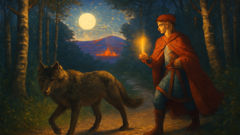
Vasilisa, Trials, and the True Light
News of the feather reached more ears than Ivan had imagined. Among those who heard was Princess Vasilisa—a woman whose name was sung in kitchens and markets, who mended a soldier’s torn cloak and offered bread to a stranger without thinking of accolades. She was the daughter of a northern duke whose lands were stitched with frozen streams and small, stubborn forests. Vasilisa read the world in slow, practical ways; she treated lights like tools for work and love like weather—something that changed and required tending. When Ivan arrived at her father's keep, he found not a gilded hall of statues but a place warmed by honest labor and slow songs. Vasilisa met him not because a prince had come bearing a feather, but because she had heard of a boy who had returned a thing of beauty rather than claiming it for glory. She wanted to know what kind of person could act so gently with lightning. Their first meeting was brief and unspectacular—over a soup bowl and a chipped wooden spoon—yet in that smallness there was a rare clarity. They spoke of ordinary things: the taste of rye bread after a long winter, the way a child's laugh could scare away the darkest moods, the small grief of a lamp that burned out in the middle of a reading. Ivan found in Vasilisa an instinct for not being blind to the quiet. She asked him, plainly, "Why did you not take more?" He did not have to invent virtues then; the story of the grey wolf and the valley came out like a map. There were no gowns and no dramatic declarations—just the slow, simple unraveling of two people who learned to hold their best selves in the same room.Sometimes, in folktales, the road to a bride is paved with impossible tasks, and in this tale, the tasks came in the guise of daily tests—small domestic trials that measured patience and the capacity to be ordinary and kind. The duke, still wary of princes from other courts, set three tasks for Ivan not to mock him but to know him. The first was to mend a net that had been torn by storms; the second was to sit and listen to the oldest woman in the village tell her tale without interrupting; the third was to help a farmer haul wood for the winter. Each task was a mirror, revealing whether Ivan could perform simple labors without seeking applause. Ivan approached each with the humility the grey wolf had taught him. He mended the net with hands that learned patience in knot after knot. He sat through stories of harvests and heartbreak, letting the old woman finish instead of inserting princely words. He learned how to split wood without judging a man’s speed. Vasilisa watched all this from the kitchen window and found something like relief: a prince willing to humiliate himself by doing the unspectacular. Yet the world of wonders never allowed peace for long. The three envious brothers who had once followed Ivan—those men whose voices were storms—had also heard of Vasilisa’s beauty and the prince who would not be bought. They came to the duke’s hall with a plan woven from old envy. They bribed servants, spread ugly rumors, and cut the ropes that held the duke's granary doors, hoping to blame Ivan and set fear against him. That winter, hunger is a poor judge of truth. Grain spilled like golden teeth into the yard; the duke's men accused with the easy confidence of those who never learned to love justice. Ivan could have fled then. He could have wrapped himself in the cloak of princely indignation and ridden away to courts of flatter praise. Instead, remembering the grey wolf's counsel about letting go, he chose to stay and to work. He helped fill the sacks, gather the grain, and even owned the humiliation when the servants pointed fingers. Vasilisa stayed by his side in small, practical ways—bringing broth, stuffing pockets with warm cloth, and offering a steady presence. The brothers' plan unraveled not because of a proclamation but because of the steady work of honest people who had watched Ivan do the right thing when the easier option was to save his reputation. When the accusations were cleared, and the duke's hall returned to its slow, hearty life, the brothers plotted one last treachery: they would steal the single feather, claim it as their own, and use it to win favor at the court where lights were applause and shadows were quiet. They crept in the night and took what they could not otherwise earn, sneaking the feather with hands made bold by selfishness. When the theft was discovered, the court rose like a storm. The duke, feeling betrayed and foolish for trusting strangers, demanded a public trial. The brothers lied with a practiced ease, pointing toward Ivan and Vasilisa as conspirators. For a moment, the world seemed to tilt—the kind of tilt that makes an honest person believe the shape of the earth is wrong. Vasilisa, however, refused the loud defense that would inflame the crowd. Instead, she stepped forward and told a story quieter than a shout: she described the way Ivan had split wood, the way he had listened to the old woman, the way he had returned the feather to the council. She reminded the room that truth does not need a chorus. Her simple testimony, paired with the earlier acts the villagers had seen, began to stitch a new understanding. The brothers were exposed not by proof but by the small web of human memories that could not be bent by a louder voice. In the aftermath, the grey wolf reappeared, as if bound by its own promise to the forest and to Ivan's fate. "You have learned the hardest lesson," it said to Ivan, "which is that sometimes to hold a light allows others to see what they must if they are to change. You did not take. You returned. And in returning, you taught." Ivan and Vasilisa began to build a life that was neither triumphal nor tragic. They married in a way typical of their kind: not by a single day of pageantry but by a dozen small mornings of making porridge and arguing about how to prune an apple tree. Their love grew not from fireworks but from seasons. Yet even as they cultivated an ordinary happiness, the tale of the Firebird continued to travel. People still sought the bird for reasons both noble and small: some wanted hope, others wanted proof of beauty to sell, some wanted to harness radiance as a currency. The kingdom learned a different lesson by slow degrees. The king, touched by his son's restraint and the quiet wisdom of a princess who mended socks and hearts with equal care, started to change how the court measured worth. He valued deeds performed without audience. He set laws that rewarded honest labor and honored the practice of returning what was taken, whether intentionally or by accident. The brothers who had tried to twist fortune into a rope found no place at court, except where they might quietly do useful work. The Firebird itself remained elusive, as it must; wonder loses its magic if caged. Yet it visited when it pleased, appearing sometimes at harvest suppers and sometimes in lonely watchtowers. Each time it came, it shone with an even more complicated beauty, reminding everyone that some lights were not meant to be trophies but to be questions—that living with brilliance often meant living with the responsibility to care for others’ shadows. Time moved on, seasons unrolled like rugs across the fields, and the story of Prince Ivan, the grey wolf, and Vasilisa became a quiet song sung in the hush after the day’s work. People told it to teach humility and steadiness. They retold it to remind one another that true worth is not always loud and that courage can sometimes be measured in the small, stubborn acts of kindness that keep a village fed and a heart honest.
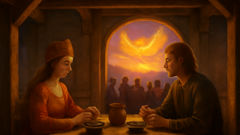
Conclusion
Years later, when children asked the elders why the Firebird never stayed in one place for long, the elders answered with a look that had been softened by time. "The bird does not belong to any hearth," they would say. "It belongs to the longing that makes us try to be better, and to the memory that, if we take too much, we will make winters last longer than they should." Prince Ivan and Vasilisa grew old in a way that poets sometimes forget to applaud: quietly, steadily, measured by mornings tended and promises kept. The grey wolf, whose nature was more spirit than animal, visited at odd hours with the same inscrutable look of a teacher who knows its pupil has learned the lesson. Once, near the end of a long summer, the Firebird returned and hovered above the couple’s orchard. It dropped a feather not as a prize but as an offering, a small bright thing that asked to be given away. Ivan and Vasilisa placed it in the town hall where children could see it and not covet it as a trophy, where it could be a lesson rather than a lure. The tale of the Firebird became not merely a story of pursuit but a gentle manual for living: to seek beauty and to know how to release it; to stand for justice and to understand that humility often speaks louder than triumph; to love someone not by owning their light but by sharing the warmth it gives. The kingdom itself changed in subtle ways—the harvests steadier, the courts kinder, and the small acts of everyday decency treated with an importance that rivals any song of war. In the hush between seasons, when the birches sighed and the river remembered names, the children would still run after traces of light, and the elders would smile. They knew that some things—like the Firebird, like goodness, like true courage—cannot be pinned down. They are better kept alive by being passed around, by being acknowledged and then set free. That was the lesson Prince Ivan and Princess Vasilisa taught, not with a single dramatic proclamation but with a lifetime spent tending small truths. In the end, the most lasting magic in their land was not the feather's glow but the steadiness of hands and the warmth of people who knew how to return what they found. The grey wolf left one night, as quietly as it had arrived, and the forest seemed to hold its breath as if to say thank you. The Firebird flew on, lighting other nights, inspiring other hearts to choose kindly. And in those choices—made in kitchens, on bridges, and in quiet fields—the kingdom learned how to hold wonder without breaking it.

